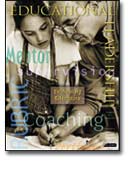I anticipated my first evaluation as a teacher with anxiety, but my colleagues told me it was nothing to fear. The principal would come into my room unannounced one day and stand in the back to observe me for 15 minutes at the most. If my students liked me, they would make me look good, waving their hands to answer questions and participating enthusiastically. That's exactly what happened, and I remember the experience fondly. My evaluation rating was satisfactory. The only criticism was that my window shades had not been at the same level. Did this experience improve my teaching? It's debatable.
Another matter, of course, was advancing on the salary schedule. To do that, evening and summer courses were in order. As a teacher of English, I took graduate-level literature courses. Did I improve my teaching? Research suggests that knowledge of subject counts a great deal. But so do such strategic abilities as being able to pace the class, vary questioning, and differentiate instruction, and, for some unexplainable reason, I never even considered taking classes on those topics. Those skills I learned only gradually through experiment and practice. On the salary schedule, my improvement went unremarked.
A revolution in evaluating educators—and in evaluating everyone from government employees to dot.com personnel—is afoot. Evolving over the last 20 years, the accountability movement ties performance to monetary rewards. Sometimes the individual's performance is under the lens, but other times, monetary awards are connected to achieving group goals, or, in the case of educators, improving the test scores of students. To receive the rewards, employees must prove that they meet the expectations.
Although pay-for-performance makes evaluation much more meaningful than in the old days, it has proved problematic in some districts. For example, when more than an expected number of Florida teachers met their goals, schools were left with decisions about finding more funds for the bonuses, limiting the number of teachers eligible, or, perhaps for the next year, reducing the bonuses.
Opponents of pay-for-performance also warn that the expectations need to be carefully thought out because the goals tied to monetary awards will be those that employees will concentrate on achieving to the detriment of other, possibly equally important, goals. Al Ramirez (p. 16) points out that a concern with any extrinsic reward system is that it may cause employees whose teamwork should be encouraged to become more competitive.
Meanwhile, running parallel with the accountability trend is another movement—the effort to set standards of good teaching for various grade levels and disciplines and to offer incentives to teachers to help them meet these standards. This trend may be tied to evaluation but has as its primary purpose the professional development of teachers. The National Board for Professional Teaching Standards (NBPTS) has taken the leadership in formulating what it means to be an expert teacher and in recognizing those who become nationally certified.
In an effort to connect both accountability and standards, Cincinnati will be among the first school systems to shelve its traditional salary schedule and link its compensation plan with professional development. Teachers will be required to advance through five career categories—apprentice, novice, career, advanced, and accomplished. A principal and a consulting teacher will conduct assessments of each teacher on six occasions, rating teachers from 1 to 4 on 16 standards. Teachers also will need to submit portfolios, student work, a log of parent contacts, and a list of professional activities.
These comprehensive evaluations will take place at different stages in a teacher's career, from two years after being hired for the apprentice level, to one to five year intervals for the more advanced levels. Should teachers fail to advance through the career category, they will have their pay cut after two tries or may not have their contracts renewed. The educators, will however, know the criteria for advancing and conceivably could seek out assistance from mentors to master the 16 standards.
All this is a far cry from the 15-minute annual observation by the principal. And the movements—pay-for-performance and career ladders—are signs that the education profession has made strides in evaluating its own.
This issue looks at a number of ways that schools, districts, and the profession as a whole are using to make evaluation more meaningful. Carnegie Foundation President Lee Shulman (p. 6) leads off by describing the remarkable progress of the NBPTS. Its standards for teachers and the ubiquity of its assessments will, over time, have a great impact on teacher preparation programs, and on all teachers, he tells us. No longer will teaching be seen as a generic activity, but as an art that is discipline-specific, age-specific, and context-specific. The issues concerning the professionalization of teaching that used to be so debatable are less so now, and that is very encouraging.
